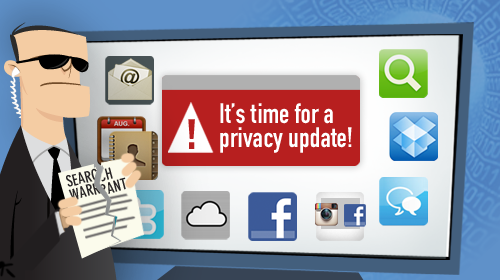
There's a wave of transparency reports sweeping the nation. In recent months a plethora of companies – including Microsoft, Facebook, Apple, and Twitter – have released these detailed documents, which describe the number of requests they get from the government to divulge their users' information and how they comply. Many of these reports are recent developments – Apple released its first report last week – and almost certainly spurred in some part by companies' desire to reassure users in light of the NSA scandals. Nonetheless it's a welcome development. As we have repeatedly said, the only way we can learn how our data is used is if companies tell us.
Today brings the release of the latest version of the granddaddy of all these efforts: Google's transparency report. Google has been doing this the longest – their data goes back to the middle of 2009 – and its most recent report really highlights the value of that: It demonstrates the scary trend at work here. Over the last four years, the number of law enforcement requests in the U.S. alone has increased by a staggering 203 percent. In the last half of 2009, Google fielded 3,580 requests. For the first half of 2013: 10,918.
Of course these numbers are from just one company. The total number of disclosures required by Google, Facebook, Microsoft, Apple, and Twitter during the most recent reporting period is approximately 64,000 users. (Some companies only report approximate numbers.) That number is further dwarfed by disclosures from telecommunications companies like Verizon and AT&T. Those companies don't provide transparency reports, but according to disclosures they've made to members of Congress, law enforcement sought information from them on a mind-blowing 1.3 million users in 2011.
We've just thrown out a lot of numbers, but the bottom line is simple: Internet and telecommunications companies are the go-to source for police to get fast access to a person's information and that trend is accelerating dramatically. When police want to know about us, they go to the same place the rest of us do for information: the internet and the companies that make it work. Given the prevalence of the internet in our lives, that is unlikely to change any time in the near future.
Obviously the idea of our email, surfing habits, and Internet lives laid bare before the government isn't a pretty picture, but what really harms our privacy is a lack of good legal protections. The rules protecting our privacy online are seriously out of date. The Electronic Communications Privacy Act (ECPA) was passed in 1986 and hasn't been substantially updated since. That was back when Top Gun was in the movie theaters, email was in its infancy, and mobile phones were the size of bricks.
In short, we need a privacy upgrade. That's just what many advocacy groups like the ACLU, Electronic Frontier Foundation, and Americans for Tax Reform, as well as companies like Google and Microsoft, have gotten together to do. We've formed a coalition that supports bipartisan legislation by Senator Patrick Leahy (D-Vt.) and Senator Mike Lee (R-Utah) to update ECPA. You can help. We're currently pushing the Obama Administration to support this legislation. Please sign our petition here.
The purpose of transparency is to let us know what's really happening with our personal information and give us the tools to do something about it. Companies have stepped up and finally begun to do their part. Now we have to push the administration and Congress to take the necessary steps to make sure we have the electronic privacy rights we deserve for the internet age.
You know there's no difference between the privacy of an email and that of a letter. It's time the law acknowledged the same thing.
Learn more about privacy and other civil liberty issues: Sign up for breaking news alerts, follow us on Twitter, and like us on Facebook.


